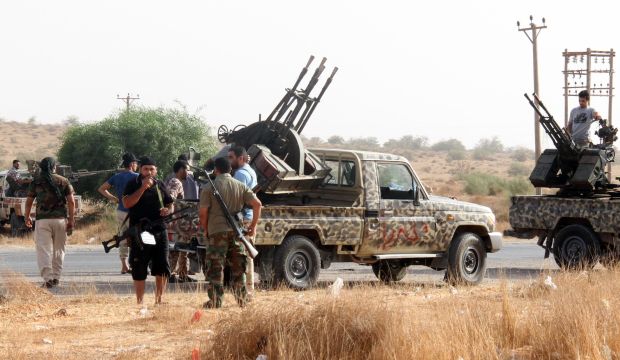It is no exaggeration to say that we will pay a hefty price if we continue to neglect the tragic situation in Libya. News coming out of this Arab country indicates that things are going from bad to worse and fighting between the warring militias is becoming more ferocious, while the world continues to watch indifferently, or at best, take limited steps of no real impact.
This disinterest continues despite the fact that the deteriorating situation in Libya is likely to produce another Islamic State of Iraq and Syria (ISIS). The absence of a strong central authority, chaos and the proliferation of weapons and extremist groups—some of which are affiliated with Al-Qaeda—make for an ideal environment for terror groups whose dreams and delusions have expanded with the recent phenomenon of ISIS.
Western countries that participated enthusiastically in the overthrow of Muammar Gaddafi’s regime do not seem to be interested in intervening in Libya to help it out of its current crisis. A waiting game marks much of the Western policy at present, with the pretext that Western strategy-makers have more pressing issues to deal with. ISIS has become the target of every Western move following its swift expansion from Syria into Iraq and the collapse of the Iraqi army, despite its US training, when it was faced with a few hundred Islamist militants, who presumably lack the high-level training and sophisticated weaponry of a regular army.
It is true that ISIS remains something of a mystery, but what is more mysterious is the rapid collapse of Arab armies despite the large amounts of money being spent on them. So far, both the Iraqi and Yemeni armies have collapsed in the wake of both ISIS and the Houthis, respectively.
In Libya, there is no truly professional army because the country is not stable enough to build a new, coherent military to replace Gaddafi’s militias or the militias fighting for control of the war-weary country. Even if there were a professional army, we do not know whether it would have held together against the advancing militias or collapsed, as was the case in other Arab countries.
However, the Libyan case is significantly different from others in the region; the army is weak and still in the construction phase. It is therefore understandable that it is unable to confront the militias controlling most of the country. Libya also suffers from the absence of a strong central government due to the fact that the conflict has produced two competing governing bodies with their own parliaments and military commands.
The worsening crisis in Libya will certainly have serious repercussions on neighboring countries. The six countries that share borders with Libya are all vulnerable, particularly if extremist groups tighten their grip over the country, turning it into a new arena of terror. We should not forget that Libya overlooks Europe across the Mediterranean. When countries in southern Europe are complaining about the flow of illegal immigrants, what will the situation look like if Libya slides further into violence and tribal infighting? What if Libya becomes a destination for terrorists forced out of their “Islamic State” in Syria and Iraq by the airstrikes of the international coalition? These groups would look for another hotbed and could find fertile soil in Libya, a country that contains active Al-Qaeda-linked groups. Egypt and Algeria, which have their own extremist groups, would be the most affected if Libya turned into a breeding ground for terror groups always on the lookout for a nurturing environment. Sudan could also be added to the list following the recent news of Al-Qaeda opening a branch there for the first time in the history of the country thanks to Muslim Brotherhood leaders in Khartoum.
Libya needs help from the outside world to enable it to overcome a crisis that, if neglected, will only worsen. Arab and international responses so far have failed to live up to the degree of seriousness of the situation in Libya. The announcement of the UN mission to Libya to organize a “dialogue” does not amount to a serious move to help Libya out of its crisis. As for the Arab world, which is supposed to be directly concerned with the issue, the majority of countries have been behaving as if developments were taking place on a different planet. The limited steps and the hackneyed statements issued by the Arab League won’t convince anyone that its policy—so far marked by incompetence—on the crises that have hit several Arab countries, will change in the case of Libya.
In order to help Libya, the concerned neighboring countries, along with the Arab Gulf states, have to mount pressure on the international community to hold a conference, attended by the Libyan sides, with the aim of reaching an agreement under Arab and international auspices to restore stability to this country and prevent its further disintegration and slide into destructive war, from which many other countries would not be safe. This is at least what the “international coalition” owes to Libya after participating in the overthrow of its former regime.

The Libyan Leader Muammar al Qadhafi warned about the possibility of all this unfolding saying famously, I quote: “You will regret when the day to regret is meaningless, Libya is not Egypt or Tunisia”.